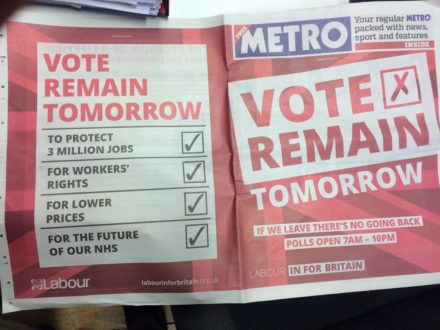
The Brexit vote shone a light on the dark recesses of the disconnect between a London Labour party and our voters in the rest of the country. A pro-EU Labour grouping in the capital is comfortable with the scale of migration and the UK’s place in a globalised world can be contrasted with that of the North and Midlands, which for a while voiced concern on these topics – but have felt unheard. What this light has revealed is painful, but utterly predictable. What is of concern is the deafening silence of recognition.
For the Labour party to offer a second EU referendum or any parliamentary vote to defy the will of the majority of people would be to risk this disconnect going apoplectic. Labours voters in parliamentary seats in the north and midlands have already voted against their party once on this issue. These are Labour heartlands where people have voted for the party for generations and in areas where it is – or was – for the working classes. They’ve broken the historic voting link once – and they have seen that the world didn’t end in doing so.
It is this that makes their possible switch to UKIP all the less traumatic for them, and likely if a London-dominated pro-EU Labour party refuses to hear them, and then gives them then middle finger and supports a second referendum. With the support Theresa May has in the polls, it only takes 1,000 Labour voters in each seat to either stay at home, or vote UKIP, and the PLP loses some working class champion Labour MPs.
The PM may seek her mandate for her Brexit conclusions via a snap general election which would mean Labour having to take a line on immigration. We tried this before with Ed Miliband’s proposal for “controlled immigration” but it was scoffed at by a certain cohort of Labour members. The party is going to have to find the middle path that recognises the discontent with immigration outside London, but satisfy pro-immigration Labour members, and keep both in the tent. Labour failed to talk about immigration for over a decade and created a vacuum of debate. While UKIP initially filled that vacuum, the Conservatives seek to occupy that space and talk directly to people who were our core voters.
A third way on immigration is possible. It is not the easiest argument to make, but it is the right one for the country, and for those from abroad already here contributing. Immigration is the lifeblood renewal of our ageing nation. Labour need to be articulating the benefits of immigration, but recognise its problems and be the author of the solutions.
At the next election the Tories and UKIP have the potential to be more in tune with working class communities on immigration than Labour. But these communities are served least well by the right-wing political parties. Labour must not get this wrong.
There are many inspiring working class MPs whose majorities might disappear at a snap general election. It should be the case that we collectively decide those MPs in greatest peril and allocate our labour and gold accordingly. We may choose to campaign for and contribute to certain MPs through personal links, or by simple electoral calculus. But we must be ready. With Labour, on some measures, currently at a record low in the polls then the next election will not be about Labour gains, but preventing a haemorrhage.
There will be a slow drumbeat to war. Conservative MPs who opinion polls consistently putting the Government on 40 per cent – and with Labour lucky to get in to the high 20s – will seek to increase their majority and their hold on power. Opposition parties seeking relevance in a Tory-dominated parliament and the media will ask if May needs her own mandate.
May dangles the sword of Damocles at her will, and when she moves for a general election we must be ready to fight for those MPs that can be saved.
Mike McLaughlin is an A&E doctor who has worked in the north and south of England. He writes on health policy, foreign affairs and LGBT issues.




More from LabourList
‘The cost of living crisis is still Britain’s defining political challenge’
‘Nurses are finally getting the recognition they deserve’
Letters to the Editor – week ending 15th February 2026